The WW1 poet kids are taught to dislike
- Published
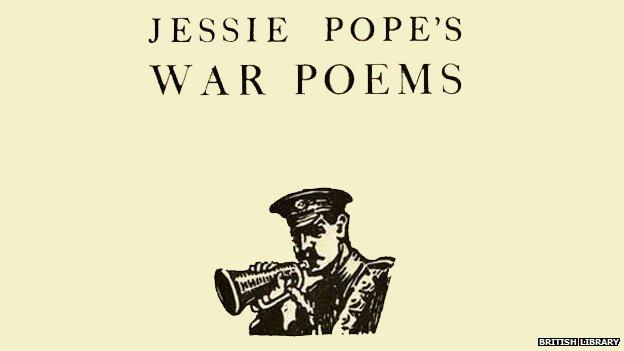
Jessie Pope is no longer a household name, but during World War One she was one of the most widely read poets. After decades in obscurity she has re-emerged to become a fixture on the English literature syllabus, but for all the wrong reasons.
Which war poets do today's English literature students know?
A recent survey of 100 British secondary schools found that Wilfred Owen and Siegfried Sassoon were the two most commonly studied.
But just behind those two chroniclers of the Great War's slaughter came a less familiar name - Jessie Pope.
Pope's verses are apparently studied by more pupils than the works of a litany of towering writers from WW1. Ernest Hemingway, Vera Brittain, Robert Graves and Erich Maria Remarque are all read less by modern students it seems.
It's unlikely though that Jessie Pope would relish her high profile. She is the war poet students love to hate.
"Our modern judgmental teenagers have no doubt at all about what they think of Jessie. She is the villain of the war," says George Simmers, a retired English teacher-turned blogger on WW1 and English literature. He has marked plenty of A-level scripts with something to say about Jessie Pope, none of it good.
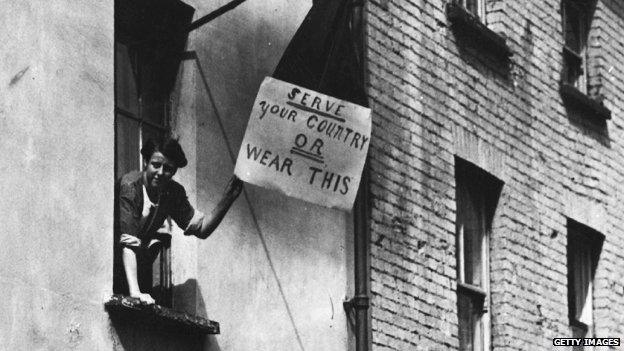
Pope's work reflected popular British attitudes towards the war
"Many candidates have harsh words for generals. But the sins of the top brass fade into insignificance besides those of Jessie."
Before the war, Pope was a popular writer of light verse, praised by London's Evening Standard for her "nimble wit" and "shrewd observation of life". When war started, she became a vehement supporter. Her verses encouraged young men to sign up, women to buck up and everyone to pull together.
"Who's for the Game?" which first appeared in the Daily Express in November 1915, is typical:
Who knows it won't be a picnic - not much-
Yet eagerly shoulders a gun?
Who would much rather come back with a crutch
Than lie low and be out of the fun?
Held up for comparison against the likes of Owen's Dulce Et Decorum Est - as it often is in English assessments - it's obvious why such examples of Pope's war poetry are ridiculed. With the benefit of hindsight, the sentiments now seem crass, even sinister, and the light, tripping style appallingly inappropriate.
David Roberts is the editor of Minds at War, an anthology of World War One poetry used in schools which includes some of Jessie Pope's work.
"Speaking as a former teacher, I think her status as a well-studied poet owes almost everything to Wilfred Owen, who was revolted by her attitude and lack of insight into the experience of soldiers in the trenches," he says.
"Dulce et Decorum Est was originally written as a response to Jessie Pope and I think it's this fact which has led teachers to look at her poetry."

Dulce Et Decorum Est
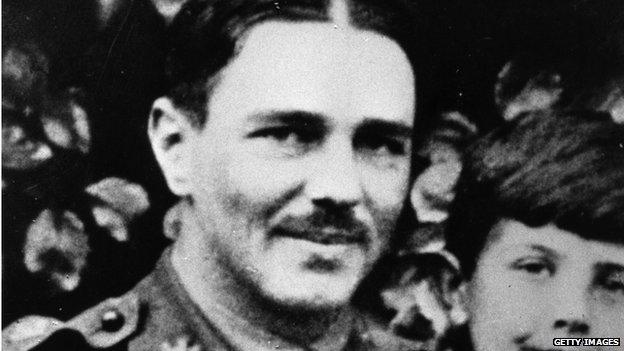
Probably the most famous of all WW1 verse, Wilfred Owen wrote this poem while convalescing at Craiglockhart Hospital in 1917
Poem describes a mustard gas attack on British troops, and the failing struggle of one of the narrator's fellow troops to get his gas mask on in time
Title is a quotation from the Roman poet Horace: "Dulce et decorum est pro patria mori" ("It is gentle and dignified to die for one's country") - Owen calls this "the old lie" and contrasts it with the sight of his dying comrade, "the white eyes writhing in his face/ His hanging face, like a devil's sick of sin"

But is it fair to single her out as a jingoist?
Simmers doesn't think so.
"Teachers will take a poem like Who's for the Game? and say this is typical of the people who were propagandising the war, which of course is completely untrue."
Simmers argues that the patriotic sentiments expressed in Pope's verses were what many wanted to hear at the time, rather than those found in the "select canon" of war poetry, generally condemning the war, studied with reverence today.
As well as hundreds of poems for the Mail and the Express, she published three books of verse - Jessie Pope's War Poems (1915), More War Poems By Jessie Pope (1915) and Simple Rhymes For Stirring Times (1916).
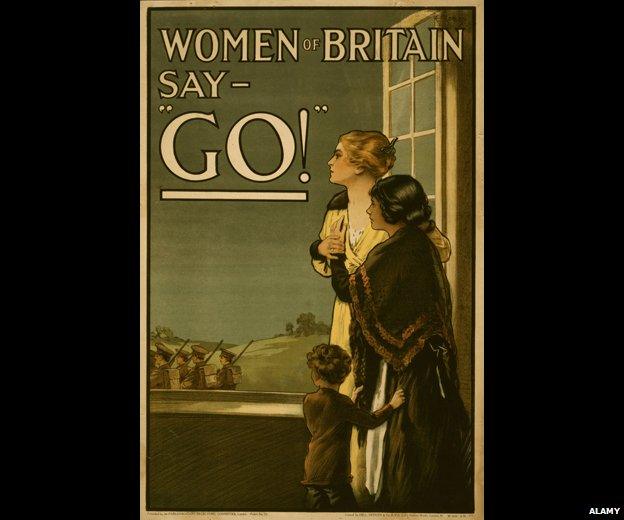
There were warm reviews. "Apt and racy. Every one hitting a different point on the head with a sharp tap," was the verdict of the Times on More War Poems.
It's also possible though to find darker tones in some of Pope's poems. The very first one, published in the Daily Mail, on 11 September 1914, was called Play the Game and urged the abandonment of professional football for the duration of the war, a deadly "game".
Start and stiff 'neath a stranger's sky
A few hundred miles away,
War-worn, khaki-clad figures lie,
Their faces rigid and grey"
It's no surprise that Pope features so widely in English lessons, says Dr Ann-Marie Einhaus, lecturer in modern and contemporary literature at Northumbria University. She was one of the authors of The First World War In The Classroom, the project which examined how the war is taught in history and English literature lessons, particularly for GCSE and A-level students.
"My theory is when you are teaching, especially at GCSE level, what you need is a clear message," says Einhaus. "So you travel the journey from jingoism to total disillusionment and Jessie Pope fits well with that. It's particularly handy to beat her with the stick of disillusionment."
Roberts agrees: "I'm sure she is studied not for the quality of her poetry, but because she provides material to contrast and compare with the poetry of Wilfred Owen and others."
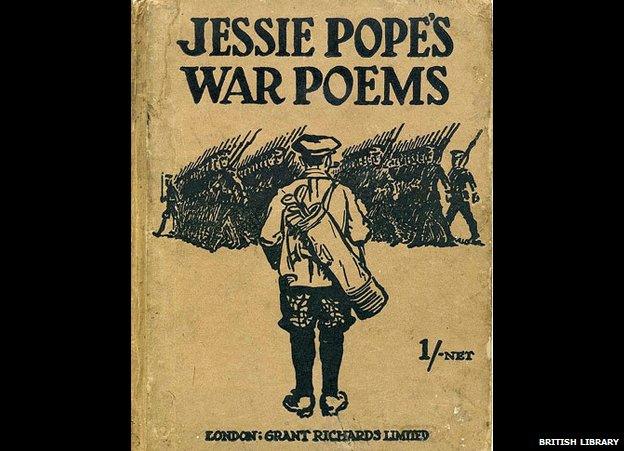
But pushing Jessie Pope's lightweight work into the ring to face poetic heavyweights like Owen and Sassoon is a literary mismatch, argues Simmers.
"There's not very much there. This is someone who was looking to entertain people, not a very good poet," he says.
"Look at a poem like Into Battle by Julian Grenfell. That would make a far better comparison with Owen, two very good poets saying very different things."
Einhaus says another factor also makes Jessie Pope an easy target, both for Wilfred Owen when he wrote Dulce et Decorum Est and now - her sex meant she couldn't go to war.
"I wonder about the misogyny in the poetry of Owen and Sassoon, in poems like Glory Of Women or even Disabled. It isn't Jessie Pope's fault that even if she had wanted to go and fight - though I'm not saying she did - she couldn't have."
The tendency of schools to use poetry analysis when exploring the literature of WW1 helps explain why Pope is singled out. Other writers and entertainers used their profile during the war to support it, but their roles have been forgotten.
The music hall star Vesta Tilley was perhaps the most famous of all. Famed for impersonating men, she was nicknamed "England's Greatest Recruiting Sergeant" for singing songs like The Army of Today's All Right while dressed in uniform. If anything, the lyrics are even more unabashed than some of Pope's verses.
Then the band played, and they all hoorayed
"You've saved us" said Kitchener with delight
I joined the army yesterday so the army of today's all right.
Yes, it's right
During her performances Tilley would encourage young men in the audience to enlist on the spot by tapping likely-looking recruits in the packed theatre on the shoulder. Tilley was hugely popular before, during and after the war, with no apparent dent to her reputation.
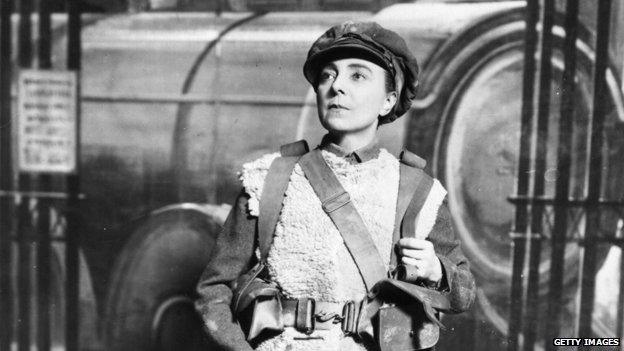
Music hall star Vesta Tilley - "England's greatest recruiting sergeant" - performs in military uniform, 1916
Pope published one more collection of poems after the War, called Hits And Misses (1920). It included one called A Despot which again hinted at a greater realism.
He scares every feminine breast,
He brings - is it sorrow or joy?
And he is - as no doubt before this you'll have guessed -
The telegraph boy.
Jessie Pope had largely passed into obscurity by the time she died in 1941, with another world war raging. Her books of war poems were not reprinted. It was another 40 years before she, and they, were "rediscovered".
"I really don't think that she was well known or anthologised at all for the longest time. She makes a tentative comeback in an anthology of women's poems published in 1981, Catherine Reilly's Scars Upon My Heart," says Einhaus.
A progression into other poetry anthologies followed. From there it was a short step to comparison essays with Owen and Sassoon.

Pope's work is mainly found in WW1 poetry anthologies
Christopher Martin edited the anthology War Poems, published in 2004, and one of those to include some of Jessie Pope's work.
However he has a higher opinion of her than GCSE and A-level English students who use his book.
"I personally think that Pope was a brave little person who earned her own living in that awful suffragette era when women were so abused and downtrodden," says Martin.
Pope did indeed support herself throughout her working life with her writing and only married when she was 61. Perhaps most surprisingly, she played a pivotal role in the publication of one of the best-known works of socialist literature, Robert Tressell's The Ragged-Trousered Philanthropists."
Tressell tried and failed to get it published in his lifetime. After his death, his daughter showed it to Pope. She persuaded her publisher of its merits, and he in turn commissioned Pope to abridge it, though some critics would say she was too zealous in her pruning.
The centenary of the start of WW1 sparked a new debate over how the war is taught in schools. Despite that, Einhaus says she can't see a more subtle approach benefiting Jessie Pope's reputation any time soon.
"There's definitely a lot of willingness to teach a more nuanced view of WW1 writing, but teachers don't have much time, alternative texts are often quite difficult and it's also about what you already have in the store cupboard.
"In the end, it's not the job of English literature teachers to teach history, it's their job to teach literature and language."
It seems Jessie Pope is liable to suffer posthumous humiliation for a while yet.

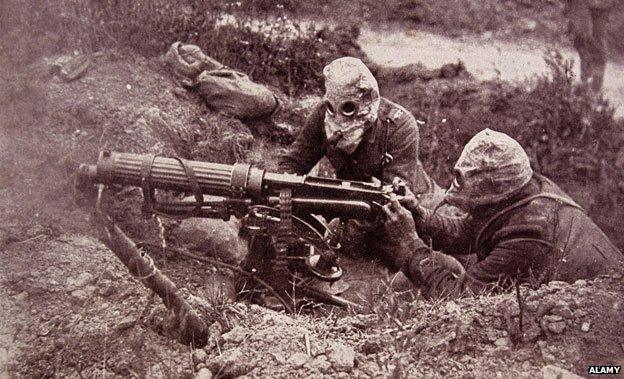

Subscribe to the BBC News Magazine's email newsletter, external to get articles sent to your inbox.